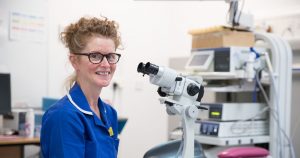We are incredibly proud of all our nurses, midwives and allied health professionals.
It is their commitment and dedication towards ensuring we can provide healthcare at its best for every single patient we see that makes our organisation ‘outstanding’.
Our ‘spotlight’ zone allows us to showcase the breadth and diversity of roles we have here at Newcastle Hospitals and to meet the amazing people who share what their job means to them, and why they love what they do.
Jill Fozzard is a Nurse Colposcopist in the Women’s Health Unit at the RVI

Jill reflects on her journey starting our as a budding theatre designer to a senior nurse, caring for some of our most vulnerable patients in our Women’s Health Unit.
Where did it all start?
At the age of 18 I thought I was following my dream of studying the arts and went off to do a course in theatre design and English but it wasn’t for me and I subsequently explored physiotherapy (I had done a work placement in a practice whilst at school and it looked interesting).
However, as I looked more into the profession I thought nursing might be more what I was looking for in a career that might enable me to work anywhere with a greater variety of options in healthcare. I thought it might be a stepping stone to something else as I have had several breaks in nursing but I have always come back to it.
I’m still nursing many years later and very happy with my choice. It has offered me many opportunities and enabled me to have an additional role to my main one in teaching and training nurses to take cervical samples.
What does a typical day look like for you?
A busy out patient clinic with women attending the department following referrals from a wide variety of sources. Most of our patients have had abnormal cervical samples (smears) and require a closer examination of the cervix (colposcopy) and sometimes biopsies and treatment.
The clinic is varied and no two days are the same. We see women who are pregnant where there may be concerns for the appearance of the cervix or women who may have unusual symptoms or vaginal bleeding.
Coming to the department has been shown to be similar to experiencing the big stressors in life – major surgery, bereavement, moving house and so on, so women are very anxious and unsure of what to expect. It is a fear of the unknown along with having to share one of the most intimate parts of the body to a complete stranger.
What do you love most about your job?
What I value most about my role is being able to reassure women. We have a short period of time in a consultation to engage with women, reduce their anxieties and gain their confidence whilst at the same time seeing them at their most vulnerable.
So for me, the best part of my role is seeing and feeling the relief women experience as they leave the department and I know I have, along with the amazing team I am proud to work with, given the woman an experience that is tailored to her individual needs.
Evidence shows that having a positive experience like this, means women are more likely to engage with the cervical screening programme in the future. This is really important at a time when women coming in for screening is at an all time low.
To support women having choices, I am also proud that we are able to offer members of staff the option to have their cervical sample taken in the department at a time that is convenient to them around their work commitments.